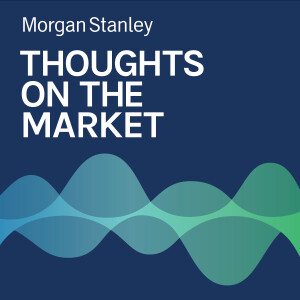
Following last night’s State of the Union Address by President Biden, what are some signals from the speech that investors should consider?
----- Transcript -----
Welcome to Thoughts on the Market. I'm Michael Zezas, Head of Global Thematic and Public Policy Research for Morgan Stanley. Along with my colleagues, bringing you a variety of perspectives, I'll be talking about the intersection between public policy and financial markets. It's Wednesday, February 8th at 10 a.m. in New York.
Last night, President Biden delivered the annual State of the Union address to a joint session of Congress. Traditionally, this speech lays out the policy proposals of the administration. In the past, this hasn't signaled much, with only about 24% of proposals historically ending up enacted that year. As a recent 538.com study highlighted. But amidst the noise, there's some potential signal for investors to consider. Here's what we're watching.
First, it's clear that U.S. policy will still drive the key investment themes of slowing globalization and the shift to a multipolar world. Biden's speech had much to say about the impact of recently enacted legislation like CHIPS+ and the Inflation Reduction Act, both of which included incentives to shift supply chains on key technologies back to the U.S. or friendly countries. One area this supports is the clean tech industry, which should see substantial demand for its U.S. produced products.
Second, it's clear that investors need to keep paying attention to the debate on tech regulation. Biden referenced bipartisan antitrust legislation aimed at tech companies. While, as we previously discussed, there's a lot of details to be worked out before this type of legislation has a fighting chance of being enacted, the momentum behind it seems to be building. So it will be important to assess the impact of different types of regulation to large cap tech companies.
Finally, and perhaps most important in the near term, the speech underscores something we've been flagging: the negotiation on how to raise the debt ceiling will be tricky and not solved in a timely manner. While calling for the debt ceiling to be raised without condition, Biden also seemed to concede there's room for negotiation on reducing the deficit. But in our view, that didn't signal a resolution was closer because the president also heavily referenced his desire for changes to the tax code to be part of that solution, something that's historically been a nonstarter for Republicans. In short, it appears in this negotiation so far, compromise has taken a backseat to rhetorical positioning by both sides. So as we stated here in the past, investors may want to prepare for an extended negotiation with a potentially late resolution, where knock-on effects to what is likely to be an already slowing economy are a distinct possibility. This is another reason our U.S. equity strategists continue to flag caution despite some solid recent performance in stocks.
Thanks for listening. If you enjoy the show, please share Thoughts on the Market with a friend or colleague, or leave us a review on Apple Podcasts. It helps more people find the show.
More Episodes
 2024-11-08
2024-11-08
 2024-11-07
2024-11-07
 2024-11-05
2024-11-05
 2024-11-01
2024-11-01
 2024-10-31
2024-10-31
 2024-10-30
2024-10-30
 2024-10-29
2024-10-29
 2024-10-28
2024-10-28
 2024-10-25
2024-10-25
 2024-10-23
2024-10-23
 2024-10-22
2024-10-22
 2024-10-15
2024-10-15
 2024-10-14
2024-10-14
Create your
podcast in
minutes
- Full-featured podcast site
- Unlimited storage and bandwidth
- Comprehensive podcast stats
- Distribute to Apple Podcasts, Spotify, and more
- Make money with your podcast
It is Free
- Privacy Policy
- Cookie Policy
- Terms of Use
- Consent Preferences
- Copyright © 2015-2024 Podbean.com





